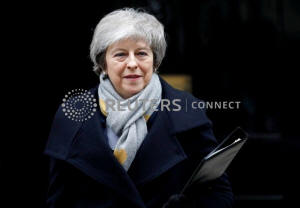|
May's departure will deepen the Brexit crisis as a new leader is
likely to want a more decisive split with the European Union,
raising the chances of a confrontation with the bloc and an
election which could usher in a socialist government.
In such a fluid situation, the world's fifth largest economy
faces an array of options including an orderly exit with a deal,
a no-deal exit, an election or a second referendum which could
ultimately reverse the 2016 decision to leave the EU.
May, who won the top job in the turmoil which followed the 2016
referendum on EU membership, has repeatedly failed to get
parliament's approval for the divorce deal she pitched as a way
to heal the Brexit divisions of the country.
But her last gambit, offering a possible second referendum and
closer trading arrangements with the EU, triggered a revolt by
some Brexit-supporting ministers. She is now under pressure to
name her departure date.
House of Commons leader Andrea Leadsom resigned, saying she felt
May's approach would not deliver Brexit. The BBC said more
ministers could follow. "May set to go after Brexit fiasco,"
read The Sun newspaper's front page, while The Times said: "May
prepares to quit after cabinet mutiny."
Foreign Secretary Jeremy Hunt said May would still be prime
minister when U.S. President Donald Trump arrives for a state
visit on June 3.
"Theresa May will be prime minister to welcome him, and rightly
so," Hunt said.
While the country remains deeply divided over Brexit, most agree
that it will shape the future of the United Kingdom for
generations to come.
Pro-Europeans fear Brexit will undermine London's position as
one of the world's top two financial capitals and weaken the
West as it grapples with Trumpís unpredictable presidency and
growing assertiveness from Russia and China.
The loss of Britain for the EU is the biggest blow yet to more
than 60 years of effort to forge European unity after two world
wars, though the 27 other members of the bloc have shown
surprising unity during the tortuous negotiations.
May, who has shown obduracy during one of the most tumultuous
premierships of recent British history, had promised to leave
office if lawmakers approved her Brexit deal but she is now
under intense pressure to name a date.
Sterling, which tumbled on the 2016 Brexit vote to its biggest
one-day fall since the early 1970s, dropped 0.4% to a new 4-1/2
month low of $1.2605. The yield on the United Kingdom's 10-year
gilt fell to 0.991%, the lowest since March 29, the day Britain
had been due to leave the EU.
Downing Street refused to comment on May's future.
BREXIT CRISIS
Nearly three years after the United Kingdom voted 52% to 48% to
leave the EU, it remains unclear how, when or even if it will
leave the European club it joined in 1973. The current deadline
to leave is Oct. 31.
When May goes, her Conservative Party will elect a leader who is
likely to want to renegotiate the deal May agreed with the EU in
November, raising the chances of a confrontation with the bloc
and a national election.
The bookmakers' favorite to succeed May is Boris Johnson, the
face of the official campaign to leave the EU, who has said he
wants a more decisive split with the bloc. More than a dozen
others are seen as potential candidates.
If there was an election and the Conservatives lost, the winner
would be Labour Party leader Jeremy Corbyn, a veteran socialist
who wants to nationalize swathes of the British economy but has
not said what shareholders will get in return.
U.S. investment bank JPMorgan raised its probability of a
no-deal Brexit to 25% from 15%, saying its base case is that
Johnson becomes prime minister, followed by a general election
and then another delay to Brexit.
Investment bank BNP Paribas said on Thursday it now saw a 40%
probability of Britain exiting the European Union without a
transition agreement in place.
The chairman of the powerful Conservative 1922 Committee, which
can make or break prime ministers, told lawmakers that May
planned to campaign in the European poll on Thursday before
meeting with the group on Friday to discuss her leadership.
"I will be meeting the prime minister on Friday following her
campaigning in the European elections tomorrow and following
that meeting I will be consulting with the 1922 executive," 1922
Committee chairman Graham Brady told reporters.
The Times newspaper reported that May would name a date for her
departure on Friday. May will remain as prime minister while her
successor is elected in a two-stage process, the newspaper said.
The delay to Brexit means voters across the United Kingdom are
going to the polls on Thursday in a European parliamentary
election that has been fought almost exclusively over the EU
divorce.
According to polling data published before polls opened, Nigel
Farage's Brexit Party was on course to win and May's
Conservatives are on course to do very badly.
Results are expected after 2100 GMT on Sunday.
(Reporting by Guy Faulconbridge; Editing by Kate Holton and
Janet Lawrence)
[© 2019 Thomson Reuters. All rights
reserved.] Copyright 2019 Reuters. All rights reserved. This material may not be published,
broadcast, rewritten or redistributed.
Thompson Reuters is solely responsible for this content.

|
|






